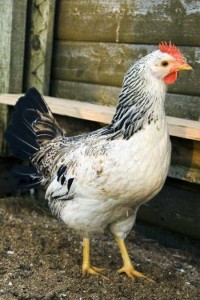Researchers are interested in tracking down the genetic origins of today’s domesticated chickens. From Science:
Their genes, and those of other isolated populations, are now being sequenced (see sidebar, p. 1022) as part of a larger effort to understand the world’s most common bird and biggest source of animal protein. In 2009, Americans ate 36 billion pounds of chicken, and the numbers keep growing, especially in developing countries in Asia and Africa. That importance is highlighted by the fact that the chicken was the first farm animal to have its genome published, back in 2004. Since then, the proliferation of factory farms, mass bird deaths from avian influenza, and dwindling diversity in chickens have raised concerns about this critical source of food.
A key thrust of research in the past decade has been to track the genetic changes that turned a remarkably shy creature into today’s meat-and-eggs dynamo, with an eye to protecting and improving breeds. But this research has also given scientists the opportunity to unravel a long-standing mystery that fascinated Charles Darwin: Where, when, and how was the chicken domesticated?…
The advent of sequencing tools in the 1990s promised a new line of evidence that went beyond physical characteristics. The results, however, have only heightened the controversy. A draft of the chicken genome, for example, isn’t enough to trace the bird’s evolution: Researchers need ancestral birds for comparison. Geneticists first used mitochondrial DNA (mtDNA) to trace the female line of the species back to its origin. Akishinomiya Fumihito, an ornithologist and prince in Japan’s royal family, extracted sections of mtDNA from Thai red jungle fowl and asserted in a 1994 paper that the findings suggested a single domestication in Thailand. Eight years later, another team used mtDNA from native Chinese chickens to support that idea.
In 2006, however, a team led by Yi-Ping Liu of China’s Kunming Institute of Zoology found nine separate clades—that is, groups descended from a common ancestor—in the mtDNA of a large sample of wild and domestic modern birds. The distribution of the clades suggests a distinct and separate expansion of lineages in southern China, Southeast Asia, and the Indian subcontinent, supporting a multiple origins theory. Another team published a study this week in Heredity based on nuclear DNA, which is not limited to the maternal line, supporting that view.
Much more at the source link. [Subscription may be required.]
